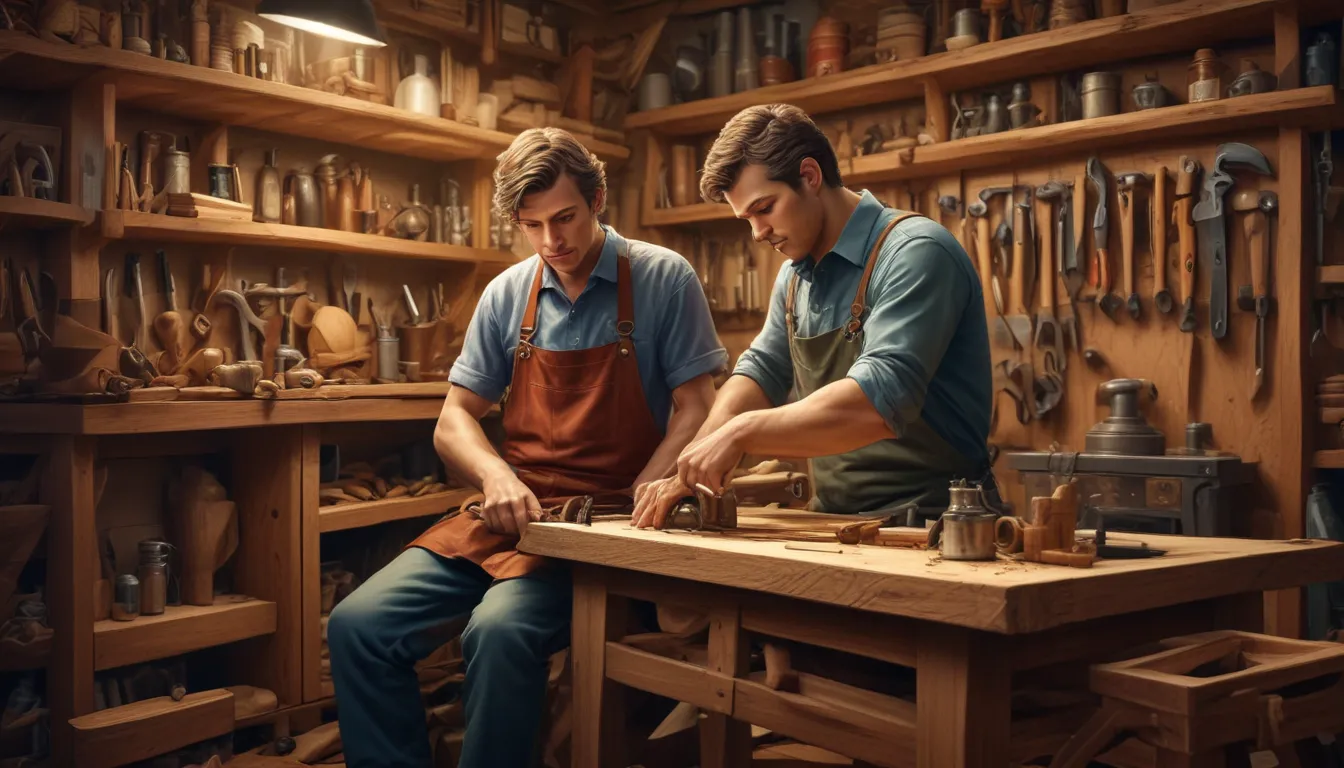The images in our articles may not match the content exactly. They are used to grab your attention, not to show the exact details in the text. The images complement the text but do not replace it.
Are you intrigued by the world of carpenters and the ancient trade of woodworking? Carpenters, skilled craftsmen who play a vital role in the construction industry, possess a wealth of knowledge and expertise in transforming raw materials into functional and aesthetically pleasing pieces. From building structures to crafting intricate furniture, carpenters are truly master builders. In this article, we will delve into 15 interesting facts about carpenters, shedding light on their skills, specialties, and the tools of their trade. Whether you’re a woodworking enthusiast or simply curious about the world of carpentry, sit back, relax, and let’s explore the secrets behind the carpenter’s craft.
The Skillful Craftsmen: Carpenters and Their Expertise
Carpenters are highly trained professionals who specialize in working with wood to create structures, furniture, and other wooden objects. Their craft goes beyond mere woodworking; it involves a deep understanding of carpentry techniques and tools. From traditional hand tools like hammers and saws to modern power tools and machinery, carpenters use a diverse array of tools to shape and manipulate wood with precision.
Diverse Projects and Specialties in Carpentry
Carpenters are involved in a wide range of projects, including building new structures and renovating existing ones. They work on residential, commercial, and industrial projects, ensuring that the structures they create are not only safe and sturdy but also aesthetically pleasing. Some carpenters choose to specialize in specific areas of carpentry, such as residential carpentry, commercial carpentry, or furniture making, allowing them to hone their skills in a particular aspect of the craft.
From Planning to Perfection: The Role of Carpenters in Construction
Carpenters play a crucial role in the entire construction process, from the initial planning stages to the final touches. They collaborate with architects, engineers, and other construction professionals to bring a project to fruition. By meticulously following measurements and blueprints, carpenters ensure the accuracy and structural integrity of the structures they create.
The Mastery of Wood: Working with Different Types of Wood
Carpenters have expertise in working with various types of wood, from hardwoods like oak and mahogany to softwoods like pine and cedar. They understand the unique characteristics of each type of wood and select the most suitable one for each project. This knowledge allows carpenters to create pieces that not only look beautiful but also endure the test of time.
Precision and Attention to Detail: The Hallmarks of Carpentry
One of the defining characteristics of carpenters is their commitment to precision and attention to detail. They take pride in their workmanship and ensure that every cut, joint, and finish is executed with accuracy. By following precise measurements and using intricate joinery techniques, carpenters create structures that are robust, durable, and visually appealing.
Keeping Up with the Times: Continuous Learning and Skill Development
In a rapidly evolving industry, carpenters understand the importance of staying up-to-date with the latest trends and technologies. They attend workshops, training programs, and educational courses to enhance their skills and knowledge. By continuously updating their expertise, carpenters ensure that they remain at the forefront of their field.
Safety First: Prioritizing Safety on Construction Sites
Safety is paramount for carpenters, who adhere to strict safety protocols and wear protective gear on construction sites. They are trained to identify potential risks and hazards, taking necessary precautions to ensure a hazard-free work environment. By prioritizing safety, carpenters protect themselves and their colleagues from harm.
Collaboration and Teamwork: Working with Other Tradespeople
Carpenters collaborate with a diverse range of tradespeople, such as electricians, plumbers, and painters, to ensure the successful completion of a project. By working together and coordinating tasks effectively, carpenters and other professionals create harmonious and efficient work environments on construction sites.
Specialized Expertise: Different Types of Carpentry Joints
Carpenters are skilled in various types of joinery techniques, including butt joints, mortise and tenon joints, and dovetail joints. They understand how different joints provide strength and stability to wooden structures, utilizing their knowledge to create durable and robust pieces.
Opportunities for Growth: Advancing in the Carpentry Field
Experienced carpenters have numerous opportunities for career advancement, including becoming supervisors, project managers, or even starting their own businesses. This allows them to take on more challenging projects, expand their professional horizons, and showcase their expertise to a broader audience.
Conclusion: The Enduring Legacy of Carpenters
From crafting custom-made furniture to building homes, carpenters leave an indelible mark on our society with their creativity and skill. Their unique blend of technical proficiency, creativity, and attention to detail makes them indispensable in the construction industry. By exploring the fascinating world of carpenters and learning about their expertise and specialties, we gain a newfound appreciation for the artistry and dedication of these master craftsmen.
FAQs: Exploring Common Questions About Carpentry
Q: What are the different types of carpentry specialties?
A: Carpentry encompasses various specialties, including rough carpentry, finish carpentry, cabinet making, joinery, restoration carpentry, and timber framing.
Q: What skills do carpenters possess?
A: Carpenters have a range of skills, including measuring and cutting wood, interpreting blueprints, operating power tools, framing structures, installing fixtures, and ensuring the overall quality and stability of a project.
Q: How long does it take to become a carpenter?
A: The time required to become a carpenter can vary. Some individuals choose to complete an apprenticeship, which typically takes around 3-4 years. Others pursue vocational training or attend trade schools, which can shorten the learning curve.
Q: What are some essential tools for carpenters?
A: Some essential tools for carpenters include a measuring tape, circular saw, chisel set, power drill, hammer, level, and various types of saws, such as a miter saw and a jigsaw.
Q: What is the role of a finish carpenter?
A: Finish carpenters focus on the final touches of a project, such as installing baseboards, crown moldings, cabinets, and other decorative elements that add aesthetic value to a structure.
Embrace the World of Carpentry
Carpenters have been shaping our world for centuries, and their legacy continues to influence the way we live and work. By delving into the intricate world of carpenters and exploring their skills and specialties, we gain a deeper understanding of the craftsmanship and dedication that go into creating functional and aesthetically pleasing structures. So, the next time you admire a beautifully crafted piece of furniture or walk through a well-built structure, take a moment to appreciate the skilled hands of a carpenter who made it all possible.






